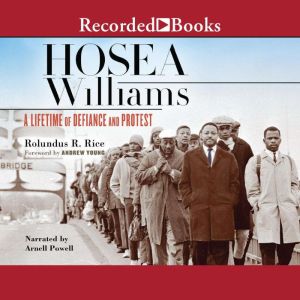

List: $29.99
| Sale: $21.00
Club: $14.99
Hosea Williams
A Lifetime of Defiance and Protest
Author: Rolundus R. Rice, Andrew Young Jr.
Narrator: Arnell Powell
Unabridged: 16 hr 47 min
Format: Digital Audiobook Download
Publisher: Recorded Books
Published: 01/25/2022
Synopsis
When civil rights leader Hosea Lorenzo Williams died in 2000, U.S. Congressman John Lewis said of him, "Hosea Williams must be looked upon as one of the founding fathers of the new America. Through his actions, he helped liberate all of us."
In this first comprehensive biography of Williams, Rolundus Rice demonstrates the truth in Lewis's words and argues that Williams's activism in the Southern Christian Leadership Conference (SCLC) was of central importance to the success of the larger civil rights movement. Rice traces Williams's journey from a local
activist in Georgia to a national leader and one of Martin Luther King Jr.'s chief lieutenants. He helped plan the Selma-to-Montgomery march and walked shoulder-to-shoulder with Lewis across the Edmund Pettus Bridge on "Bloody Sunday."
Williams played the role of enforcer in SCLC, always ready to deploy what he called his "arsenal of agitation." While his hard-charging tactics may have seemed out of step with the more diplomatic approach of other SCLC leaders, Rice suggests that it was precisely this contrast in styles that made the organization so
successful. Rice also follows Williams's career after King's assassination, as Williams moved into local Atlanta politics. While his style made him loved by some and hated by others, readers will come to appreciate the central role that Williams played in the most successful nonviolent revolution in American history.
Andrew Young Jr., former SCLC executive director, U.S. Congressman, U.S. Ambassador to the United Nations, and mayor of Atlanta, provides a foreword.
In this first comprehensive biography of Williams, Rolundus Rice demonstrates the truth in Lewis's words and argues that Williams's activism in the Southern Christian Leadership Conference (SCLC) was of central importance to the success of the larger civil rights movement. Rice traces Williams's journey from a local
activist in Georgia to a national leader and one of Martin Luther King Jr.'s chief lieutenants. He helped plan the Selma-to-Montgomery march and walked shoulder-to-shoulder with Lewis across the Edmund Pettus Bridge on "Bloody Sunday."
Williams played the role of enforcer in SCLC, always ready to deploy what he called his "arsenal of agitation." While his hard-charging tactics may have seemed out of step with the more diplomatic approach of other SCLC leaders, Rice suggests that it was precisely this contrast in styles that made the organization so
successful. Rice also follows Williams's career after King's assassination, as Williams moved into local Atlanta politics. While his style made him loved by some and hated by others, readers will come to appreciate the central role that Williams played in the most successful nonviolent revolution in American history.
Andrew Young Jr., former SCLC executive director, U.S. Congressman, U.S. Ambassador to the United Nations, and mayor of Atlanta, provides a foreword.
